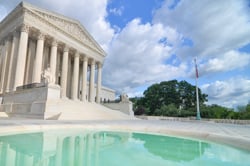SCOTUS ruling raises the stakes for Trademark Trial and Appeal Board hearings

Image from Shutterstock.
Some trademark issues decided by the Trademark Trial and Appeal Board can’t be relitigated in a federal infringement lawsuit, the U.S. Supreme Court ruled on Tuesday.
In a 7-2 opinion (PDF), the U.S. Supreme Court said unchallenged TTAB findings have preclusive effect in federal infringement suits if issues in the two proceedings are nearly identical, and other traditional rules governing collateral estoppel are satisfied. The decision raises the stakes for proceedings before the TTAB.
The majority opinion by Justice Samuel A. Alito Jr. rejected a contention that TTAB decisions can never be conclusive in federal litigation because the TTAB is not an Article III court.
The Supreme Court considered the issue in a fight between fastener companies over two similar names: Sealtight and Sealtite. The TTAB refused trademark registration for Sealtite, finding a likelihood of confusion. While the TTAB was deciding the issue, the dispute was being litigated in federal court a trademark infringement suit.
The St. Louis-based 8th U.S. Circuit Court of Appeals had rejected issue preclusion, citing differing factors used by the TTAB and the 8th Circuit to judge likelihood of confusion. Alito’s opinion, however, said the factors used are not fundamentally different.
A preview of the case by the Recorder (sub. req.) predicted that a finding of issue preclusion will affect proceedings before the TTAB. “If TTAB decisions are ultimately held to have a preclusive effect in subsequent trademark infringement litigation, then gone are the days when parties will treat these proceedings as inconsequential administrative decisions,” the story said.



